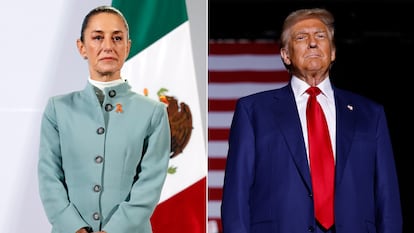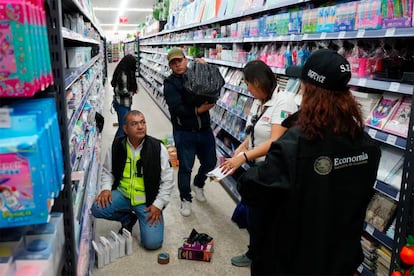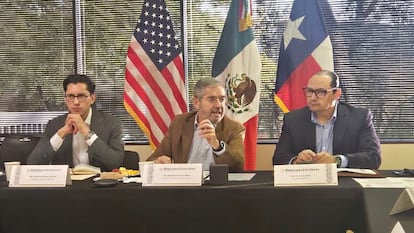Clean customs, strong consulates and the fight against fentanyl: Sheinbaum prepares Mexico for Trump’s return
The Mexican government is working against the clock to strengthen three aspects that the US has historically pointed out as weaknesses in the bilateral relationship

The Mexican government is working fast to get its homework done before January 20, when Donald Trump will be sworn in as president of the United States. Mexican President Claudia Sheinbaum has anticipated the elements of the bilateral relationship that could represent a headache for her Administration. In recent weeks, Mexican officials have been working at full speed in three specific sectors: cleaning up customs agencies, reinforcing Mexican consulates on U.S. territory, and cracking down on illegal trafficking of fentanyl. These three topics have historically proven to be the most sensitive for the U.S. government, regardless of its political orientation.
Trump’s first messages for Mexico have been heavy-handed. On the one hand, there is the threat of mass migrant deportations. Meanwhile, the Republican politician has also cast doubt on the effectiveness of the free trade agreement with Mexico and Canada, the USMCA, and has announced that he will seek an early review of the deal. And finally, he has assured that he will take action to intervene more directly in the fight against Mexican drug cartels by declaring them terrorist organizations.
Once the cards were on the table, Sheinbaum opted for a proactive approach in which the government is seeking to take charge of each of these issues. The Mexican president has rejected Trump’s messages with one of her own: “We collaborate, we coordinate, we work together, but we will never subordinate ourselves. Mexico is a free, sovereign, independent country and we do not accept interference. It is collaboration, it is coordination, but it is not subordination. And we are going to build peace,” she said in a speech in Mazatlán, Sinaloa, last week. The Mexican government has undertaken in recent weeks a series of measures that could alleviate the crisis between the two countries and, in the best-case scenario, cushion any blows that Trump decides to take against Mexico.
Clean customs
The U.S. trade war against China has put Mexico in the spotlight. The Mexican territory has become a kind of wild card that manufacturing companies take advantage of due to its proximity to the U.S. and its membership in the free trade agreement, which has proven to be a blessing and a curse at the same time: foreign direct investment has reached historic levels in recent months, while Chinese trade has found a way through Mexico to introduce its products to the American continent, attracting the attention of the U.S.’s most protectionist sectors, backed by Trump. The Republican’s threat is to evaluate the relevance of the USMCA, previously considered the best tool for trade integration in the West.
In Mexico, this threat has resulted in the so-called Operation Clean-up. For more than a month, the Ministry of Economy has undertaken a rigorous inspection of Chinese commerce in Mexico City, later extended to the states of Sonora, Coahuila and Baja California. The Mexican government is confiscating products, mostly of Asian origin, that entered Mexico illegally through customs. What began as simple actions to seize merchandise has become a larger plan to regulate the ports that receive these products.
Marcelo Ebrard, the Secretary of the Economy, has taken charge of this mission. In just over a month, he has seized 500 million pesos worth of illegal merchandise and has placed 47 customs agencies under investigation. “What we are seeing is an absolute lack of compliance with Mexican regulations. There is no evidence that any of this merchandise was introduced legally into the country. These things cannot be sold in Mexico,” Ebrard said last Friday to justify the operation.

Safe consulates
Migration has been one of the main themes of Donald Trump’s presidential campaign. His outright rejection of migration integration has inevitably put the spotlight on Mexico. Trump has assured that he will undertake mass deportations as soon as he takes office, despite the fact that both countries have invested efforts to reduce illegal crossings and are seeking alternatives for migration in various territories in Latin America.
Faced with this threat, the Ministry of Foreign Affairs has begun to reinforce its 50 consulates in the United States. The largest consular network in the world is prepared to provide legal assistance to thousands of Mexicans, if Trump’s words begin to come true in the coming weeks, according to Minister Juan Ramón de la Fuente. This effort has required acquiring the services of external lawyers specialized in immigration and the creation of a panic button through an app so that migrants can notify the Mexican government of their detentions.
De la Fuente has indicated that the Mexican government trusts in the compliance of U.S. officials with international norms. The appointment of Ron Johnson, a veteran of the CIA, as U.S. ambassador to Mexico has sent a message of toughness in the bilateral relationship and an expectation of difficult times for Mexican diplomacy. “Between the universally accepted diplomatic rules, our constitutional principles of foreign policy, and the indications that the president is giving us on specific aspects, I am truly confident that we will achieve with him [Ron Johnson], as with all the other ambassadors, a form of operation that is reasonable, respectful and effective,” declared the Mexican foreign minister.

Fight against fentanyl
Thousands of kilograms of fentanyl have been seized in Mexico in recent days: the largest shipment was a ton and a half. The tiny pill has unleashed one of the most severe health crises in recent decades in the US. Trump has also pointed to Mexico, specifically to the drug cartels. The Republican’s warning to Mexico has been that he will declare the Mexican cartels terrorist organizations, a tool that would serve to intervene more directly in the fight against them.
Mexico has been living with the consequences of the expansion of organized crime in the country for decades. The Sheinbaum administration has made it a priority to find strategies to combat these groups. The president has appointed the Secretary of Security, Omar García Harfuch, as the person in charge of showing the U.S. that Mexico is doing its part. In addition to the large seizures of fentanyl, the Mexican government has arrested more than 6,000 people in connection with drug trafficking in recent weeks. “These arrests represent progress towards building peace, because we are convinced that, in order to reduce crimes, those who commit them must also be arrested,” García Harfuch said a couple of weeks ago.
The arrest in Texas of two of the leaders of the Sinaloa Cartel, Ismael El Mayo Zambada and Joaquín Guzmán López, has unleashed an internal war in the region that has already left 600 dead in the last four months of the year. The clashes in Sinaloa have left little room for the lives of its citizens and doubts about whether Mexico’s security strategy will work this time around.
Sign up for our weekly newsletter to get more English-language news coverage from EL PAÍS USA Edition
Tu suscripción se está usando en otro dispositivo
¿Quieres añadir otro usuario a tu suscripción?
Si continúas leyendo en este dispositivo, no se podrá leer en el otro.
FlechaTu suscripción se está usando en otro dispositivo y solo puedes acceder a EL PAÍS desde un dispositivo a la vez.
Si quieres compartir tu cuenta, cambia tu suscripción a la modalidad Premium, así podrás añadir otro usuario. Cada uno accederá con su propia cuenta de email, lo que os permitirá personalizar vuestra experiencia en EL PAÍS.
¿Tienes una suscripción de empresa? Accede aquí para contratar más cuentas.
En el caso de no saber quién está usando tu cuenta, te recomendamos cambiar tu contraseña aquí.
Si decides continuar compartiendo tu cuenta, este mensaje se mostrará en tu dispositivo y en el de la otra persona que está usando tu cuenta de forma indefinida, afectando a tu experiencia de lectura. Puedes consultar aquí los términos y condiciones de la suscripción digital.









































